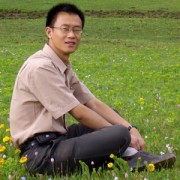Born in 1974, I have been called Jianzhong, a name seemingly patriotic because Jianzhong means building up a new China. When my father chose this name for me, he might not have anticipated that my whole life, especially my professional one, has been so closely interwined with a rapidly changing Chinese society, which has never been short of turmoil and conflicts.
When I was 2 years old, the Cultural Revolution in China ended. Two elder sisters and I still remember that for years we had been left by ourselves at night, due to the fact that our parents as well as other kids` parents were busy attending meetings after daytime work to rethink their involvement during the past ten years. And it was just the start of a series of dramatic events.
When I was 5, at the adjacent area between China and Vietnam, a war broke out and lasted for at least 7 months. The battlefield was only 300 hundred kilometers away from Gejiu, the city where I was living. In retrospect, I understand that the result of the war is a lot more far-reaching than I thought as a little boy. Months after the war ended, soldiers returned China, some of them being seen as heroes, touring around China to give speeches. It was, however, a different story for my neighbor Uncle Qin, a demobilized soldier. He lost his left arm and at least 15 kilos weight when he came home. Before he left for this war, he was a good humored man with a big smile on his face. He liked to hold me up, let me sit on his shoulders. But he came back as a totally different person, gloomy and bad tempered, never looking at me even I said hello to him. He drank a lot, even in the morning, and began to beat his wife. At one night, he tried to kill himself by swallowing a whole bottle of sleeping pills. With the wisdom of hindsight, I realized that he was very likely to have PTSD. My mother was a nurse at that time. She told me at least 4 cases of retired solders committing suicide were accepted in her hospital.
In the late 80`s and 90`s, as a teenager I witnessed another radical social change of China, that is, nationwide lay offs. In Gejiu, the small city I lived, where Tin industry has always been the pillar of the economy, a state-owned factory, and also the biggest one ever of its kind in China fired tens of thousands workers overnight. It pained me a lot in the following 10 years, things totally changed in my hometown. The peace and the unique beauty of the city have gone. The sudden rising rate of crime might be one of the first warnings. Even today, Gejiu is still one of places in China most vulnerable to drug abuse and AIDS.
It was at that time I realized that a good doctor should not only cure physical diseases but also care for the mental health of patients. As a post-graduate student, I continued to study psychiatry and psychotherapy for my master degree, mentored by Prof. Xudong Zhao. A longitudinal follow-up study for mental health of Jinuo Minority starting from 1979, as well as my first encounter with transcultural psychiatry was conducted during this period.
Jinuo Minority is the least populated minority group in China, the total number of which only amounts to 12000. Since this minority group transited directly from primitive society to modern society, during this hasted transition, modernization inevitable has an enormous impact on their mental health. I attended this study in 1999, and led the program in 2009. According to data collected during the past 30 years, psychological problems, the prognosis of schizophrenia, prevalence of depression disorder and alcohol related disorders among JiNuo group increased by considerable percentage following rapid socio-economic improvement and cultural changes.
When I was doing the research of transcultural psychiatry and psychotherapy, the Genomnics suddenly became a globally hot topic. With great passion in gene research, I spent three years doing my Ph.D in biological psychiatry at the top 1 medical school in China, Mental Health Institute, Peking University. In 2003, as the top 1 Ph.D student, I graduated from Peking University. Throughout my study in master and Ph.D degrees, my training in psychiatry had been crossing 4 different fields including transcultural psychiatry, psychotherapy, psychometrics and biological psychiatry. At that time, few doctors could have got such comprehensive training. This also greatly widened my horizon as a psychiatrist.
From 2003 I have been working in three grade A hospitals in Kunming, Yunnan Province as a psychiatrist. The most common mental disorders I diagnosed in these different hospitals are almost the same. They are side effects of radical changes in China. In a society full of lust, anxiety, distrust and even angers, people`s views of world, life style and even family structure are due to reconstruct. As a result, cases including depression, anxiety, alcoholism increased a lot. Alcoholism, psychological problems of children, family conflicts, dementia, and other mental disorders we saw little before are far more common than 20 years ago.
Why in a relatively wealthy society, compared with that of my parents` time, cases of mental disorder became even more common and complicated? What is the nature of mental disorders? What is the relation between mental disorders and culture? I am now a board member of Chinese Psychiatry Associaton, dean of psychiatry department at Second Affilated Hosptial of Kunming Medical University, editor of four books, and have published 46 scientific papers on Journals including Molecular Psychiatry, Biological Psychiatry, PLOS ONE, American Journal of Medical Genetics, Part B (Neuropsychiatr Genet), Psychiary Research, Psychiatric Genetics, International Journal of Social Psychiatry. Although I have so many titles and various duties, deep in my mind, it is always my biggest passion to help people suffering from mental disorders.
In my research and clinical practice, I have been trying to seize the nature of mental disorders in different aspects, and at the same time, to understand the psychological aspects of physical diseases. At present, I am doing research, using methods of different areas, including genetics, pharmacogenetics, epidemiology, psychometrics, psychosomatic diseases, and psychotherapy, to analyze a same disease, for example, Irritable Bowel Syndrome. It is painstaking, I have to admit, as in many cases essential statistics are simply missing, or not strong enough to draw a whole picture from a macroscopic view. I believe that transcultural psychiatry and WPA-TPS would be the best place that I can communicate and learn from. To be a board member of WPA-TPS, I feel greatly honored, as it is an opportunity to learn and spread transcultural consciousness in medicine in China, and to contribute to the strengthening of the Section.
Finally, dear colleagues, I welcome you to visit us in Kunming, Yunnan Province, China!

